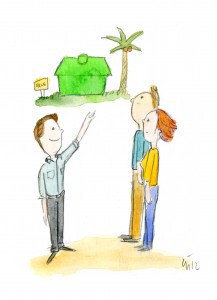‘Buying the Worst House in the Best Neighborhood Can Actually Backfire’

Oh, conventional wisdom. When it’s wrong, it’s not merely wrong. It can wreak havoc.
Quartz decided to test some of that good old conventional wisdom, specifically the adage that getting the worst house in the best neighborhood is a sound investment. The results were surprising. Or not, if you’re a determined skeptic.
we found that only rarely does the bottom 10% outperform the top 90% of houses in a ZIP code. On average, these bottom-tier homes do neither better nor worse than the others.
Looking at those numbers, we might have concluded that buying a neighborhood’s worst home is therefore a neutral investment strategy — a myth, but not a harmful one. It doesn’t maximize returns. But it doesn’t cost buyers either.
Then, however, we dug a little deeper — and we saw that buying the worst house in the best neighborhood can actually backfire. That’s because the more affluent a neighborhood is, relative to its greater metropolitan area, the worse the homes in its bottom 10% tend to perform.
In short, the nicer the neighborhood, the bigger the myth!
The cheapest houses in a spiffy neighborhood are often priced the way they are for a very good reason: they are in disrepair, or they were built on a Hellmouth, or on marshy former bleaching grounds, like the hospital in Lars Van Trier’s Danish TV show “The Kingdom.” You do not want to wake up one day and find Satan’s baby in your bathroom, that’s for sure. Puts a damper on resale value.
Also, buyers interested in pricey neighborhoods are primed to pay a certain amount. They will be suspicious of the good deal you offer, wondering whether there are ghosts in the walls or blood in the elevators. (The Overlook Hotel from The Shining was supposedly built on an old American Indian burial ground, right? Because that explains everything.)
Statistically, what’s the safest investment to make, real estate-wise?
Buy a decent house in the right neighborhood. What’s the right neighborhood? It’s the most expensive one where you can afford a home that is not in the bottom 10%.
I’d amend that to say that the right neighborhood is also the one where you feel comfortable, not simply the most expensive one. You might find that a less expensive area suits you better for whatever reason. Don’t let money, or specifically the profit motive, drive this decision entirely. Money is allowed to be in the car, sure. But if you’re going to live in this property, money should ideally stay in a passenger seat and wait to speak until you ask it to help with directions.
Support The Billfold
The Billfold continues to exist thanks to support from our readers. Help us continue to do our work by making a monthly pledge on Patreon or a one-time-only contribution through PayPal.
Comments